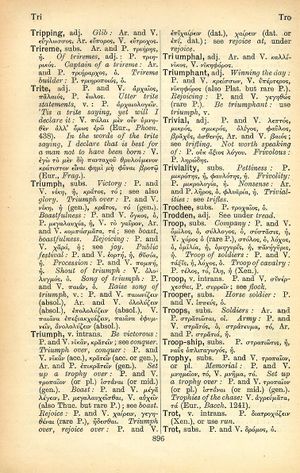trite: Difference between revisions
From LSJ
(6_16) |
(D_9) |
||
| Line 12: | Line 12: | ||
{{Lewis | {{Lewis | ||
|lshtext=<b>trĭtē</b>: ēs, f., = τρίτη; in [[music]],<br /><b>I</b> the [[third]] [[string]] or [[tone]] in the [[musical]] [[scale]], Vitr. 5, 4. | |lshtext=<b>trĭtē</b>: ēs, f., = τρίτη; in [[music]],<br /><b>I</b> the [[third]] [[string]] or [[tone]] in the [[musical]] [[scale]], Vitr. 5, 4. | ||
}} | |||
{{Gaffiot | |||
|gf=(1) <b>trĭtē</b>, ēs, f. (τρίτη), troisième corde d’un instrument de musique : Vitr. Arch. 5, 4, 5 ; Ps. Censor. Frg. 12, 5 || tierce [musique] : Vitr. | |||
}} | }} | ||
Revision as of 07:07, 14 August 2017
English > Greek (Woodhouse)
adj.
P. and V. ἀρχαῖος, παλαιός, P. ἕωλος.
Utter trite statements, v.: P. ἀρχαιολογεῖν.
'Tis a trite saying, yet will I declare it: V. πάλαι μὲν οὖν ὑμνηθὲν ἀλλʼ ὅμως ἐρῶ (Eur., Phoen. 438).
In the words of the trite saying, I declare that is best for a man not to have been born: V. ἐγὼ τὸ μὲν δὴ πανταχοῦ θρυλούμενον κράτιστον εἶναι φημὶ μὴ φῦναι βροτῷ (Eur., Frag.).
Latin > English (Lewis & Short)
trĭtē: ēs, f., = τρίτη; in music,
I the third string or tone in the musical scale, Vitr. 5, 4.
Latin > French (Gaffiot 2016)
(1) trĭtē, ēs, f. (τρίτη), troisième corde d’un instrument de musique : Vitr. Arch. 5, 4, 5 ; Ps. Censor. Frg. 12, 5 || tierce [musique] : Vitr.

